IB Orientation Session – For Grade 10IP and LP
Wednesday, 24 February 2021
Share this article:
Principal David Gray wished all parents and students a good evening and extended a very warm welcome to all, followed by an explanation of the proceedings for this evening session. He went on to note Grade 10LP students are able to apply for the Lebanese Baccalaureate as well as the International Baccalaureate. Grade 10IP have the opportunity to choose A Levels or the IB programme for their continuation at school. Mr Gray said the IB is an excellent programme. It is a holistic one and students are required to be seriously committed for the two-year programme, with students who take the IB requiring some tenacity of purpose, resilience and determination to achieve in the programme. Whatever the students choose, all three programmes on offer at BHS are very strong, each putting students in a strong position to succeed in the next stage of their lives. He stressed this session is not an event – this is a process or journey and students should take time to consider all that is available to them. A presentation on A Levels is being given on March 17th. He continued to advise students to take their time and encouraged them to discuss their options with parents.
Then Mr Georges Rizkallah, the school’s Vice Principal Academic, introduced himself and the IB Diploma Programme (IBDP) in detail. The IB aims to develop students in:
- Critical thinking and sound judgment
- Responsibility for their own learning
- A shared academic experience
- An understanding and respect for other cultures
- Education of the whole person
IB has ten core attributes and Mr Rizkallah highlighted two in this evening session, with students continuing to learn how to be principled and balanced as they progress through the programme. The curriculum was then showcased, as in the slide below:
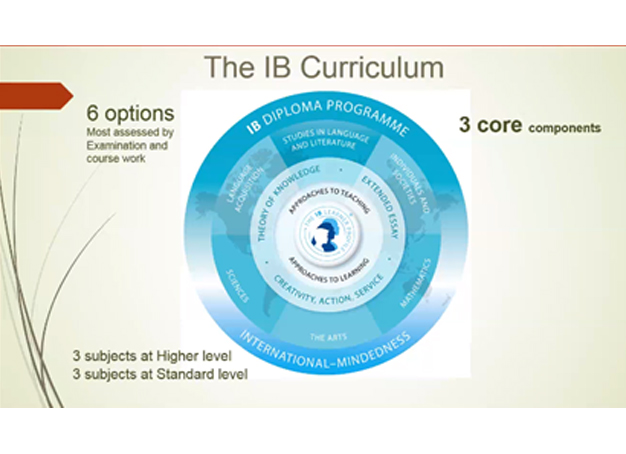
The three core components of IBDP are: Theory of Knowledge (TOK), Extended Essay (EE) and Creativity, Action, Service (CAS). He then mentioned the six groups for subject choices, and how students should navigate the groups, culminating in hopefully their preferred choices for their studies. There are Higher Level courses and Standard Level courses, with students required to take three of each. The full programme requirements are detailed below:
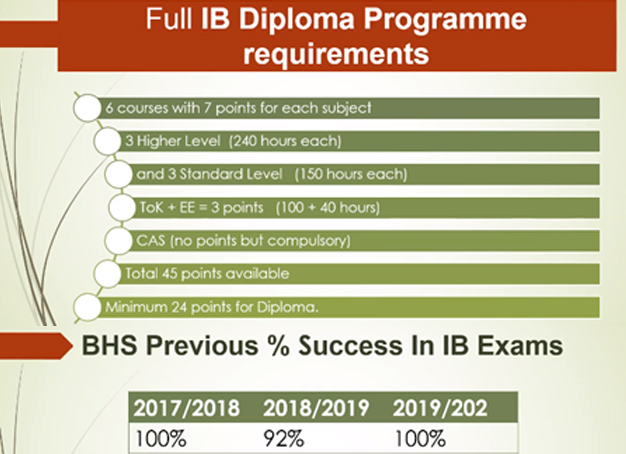
Mr Rizkallah highlighted BHS success in the IBDP since inception and then went on to say that all universities around the world think very highly of the IB, including Oxford and Cambridge in the UK and Harvard in the US.
Ms Gisele Hanna, the school’s CAS Coordinator, then explained the CAS component of the IBDP. Growing existing interests and talents is very important, as well as discovering new passions and interests. Students need to engage equally between creativity, action and service.
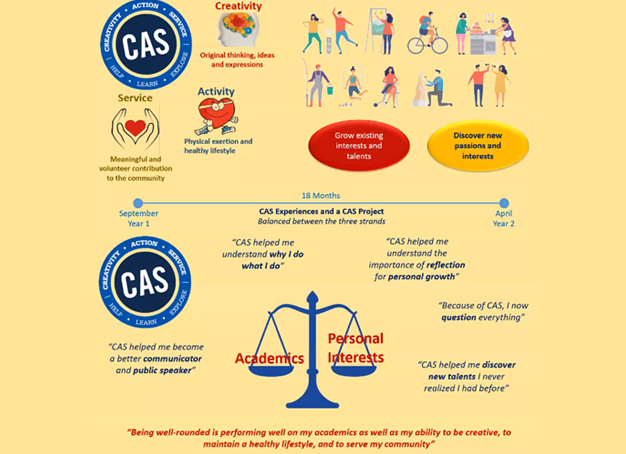
Then Ms Lisette El Hage, Head of English, spoke about the EE core component, which is obligatory, just as TOK and CAS are. A 4,000 word essay is what is asked for, which she said sounds like a lot but actually is not a great deal once students get started, particularly as they are used to writing essays of 1,000 and 1,500 words regularly in class. The EE is introduced very slowly, very carefully during the IBDP at BHS. Students need to write their essay in a subject they are focusing on in the IBDP. The EE experience allows students to then arrive at university being in a great position for their essay writing opportunities and demands there, having gained a great deal of experience and expertise in this learning and assessment method.
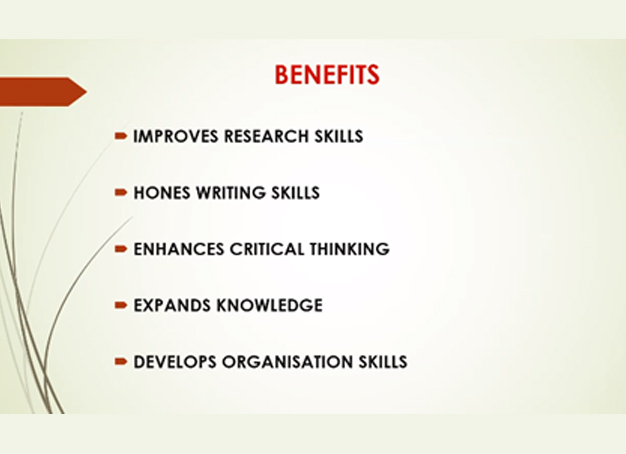
Following that, Ms Zeina Misk introduced TOK and why it is so important. TOK plays the role of a connector between all the subjects, and teachers operate as a facilitator rather than a traditional teacher, allowing students to take off on their very exciting journey of TOK and for life. The newly added dimension of the TOK this year is the exhibition which is a very exciting extra component for students. The whole course allows students to become critical thinkers and to connect with the IB learner profile. TOK is the only subject in IB that is taught yet students do not sit for an exam. External assessment is through the 1,600 word essay, with internal assessment through the exhibition.
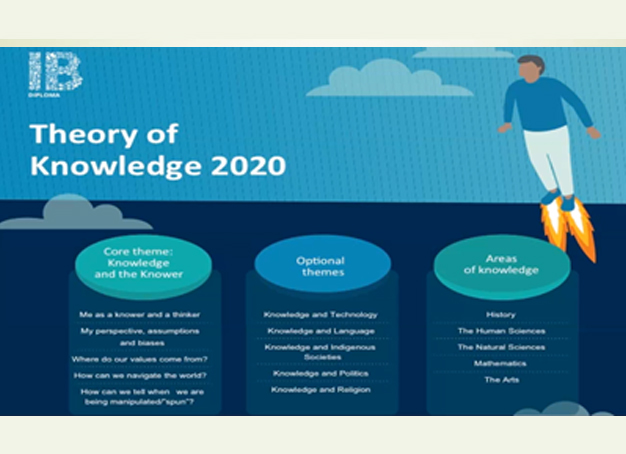
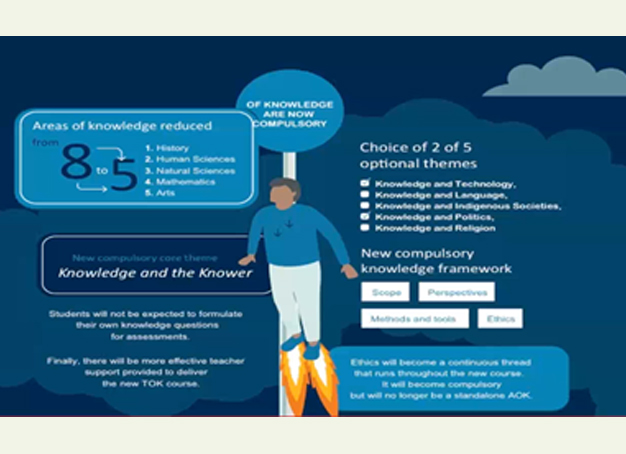
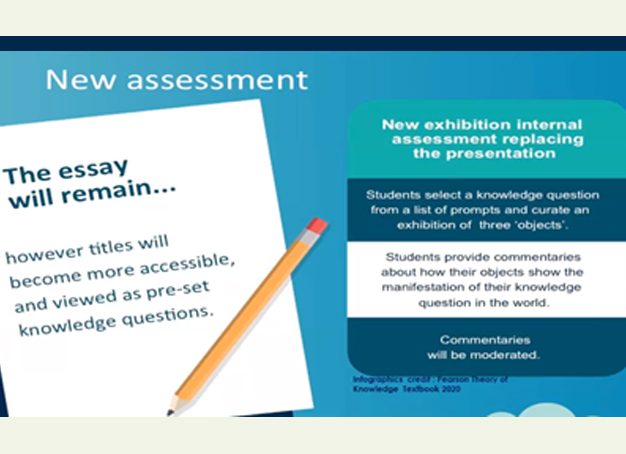
Following Ms Misk, Ms Christina Nakhle provided information on the ITGS course, standing for Information Technology in a Global Society. She introduced the three strands of Social and Ethical Significance, Application to Specified Scenarios and IT Systems. The course is available in SL and HL format. Ms Christina then spoke about the different assessments for the course.
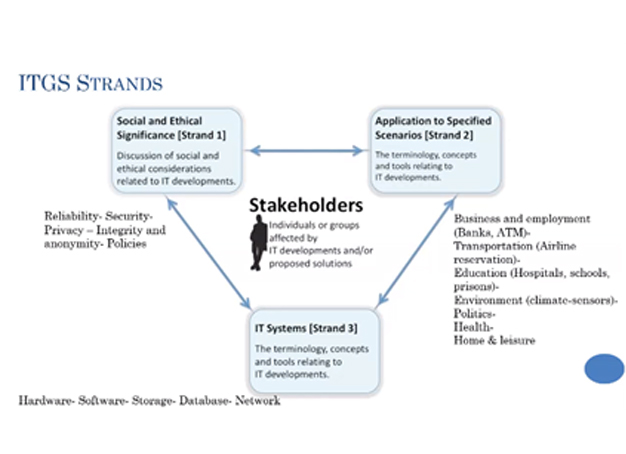
Mr Rizkallah thanked the IB team and then invited parents and students to ask questions. One parent asked what the criteria is for joining the IB, also asking if a student change from IB to LB after the first few weeks. The school’s VPA explained that a strong grasp in the English language is very important, and assessment is made via the cover letter, and with a panel interview if required. He confirmed that students could leave the IBDP and join the LB if they did not feel comfortable. Mr Gray stressed that the IBDP is a commitment and students require great stamina, with the panel only designed to assess students to make sure they are ready for the challenge. Past academic performance is assessed as well as the quality of their cover letter. The panel typically consists of five or six people. Another parent asked if students coming from the LP section would be at a disadvantage joining the IB. Mr Rizkallah stressed there is no issue at all with this, with students well-prepared in the LP at BHS being absolutely fine. A final point he added was that governmental obligated courses are Arabic and History/Civics for students entering the IBDP from LP, yet only Arabic is an exam subject, with the other subjects administered in a discussion setting.
Finally, our VPA said thank you to all who had attended and wished them a good evening ahead.




